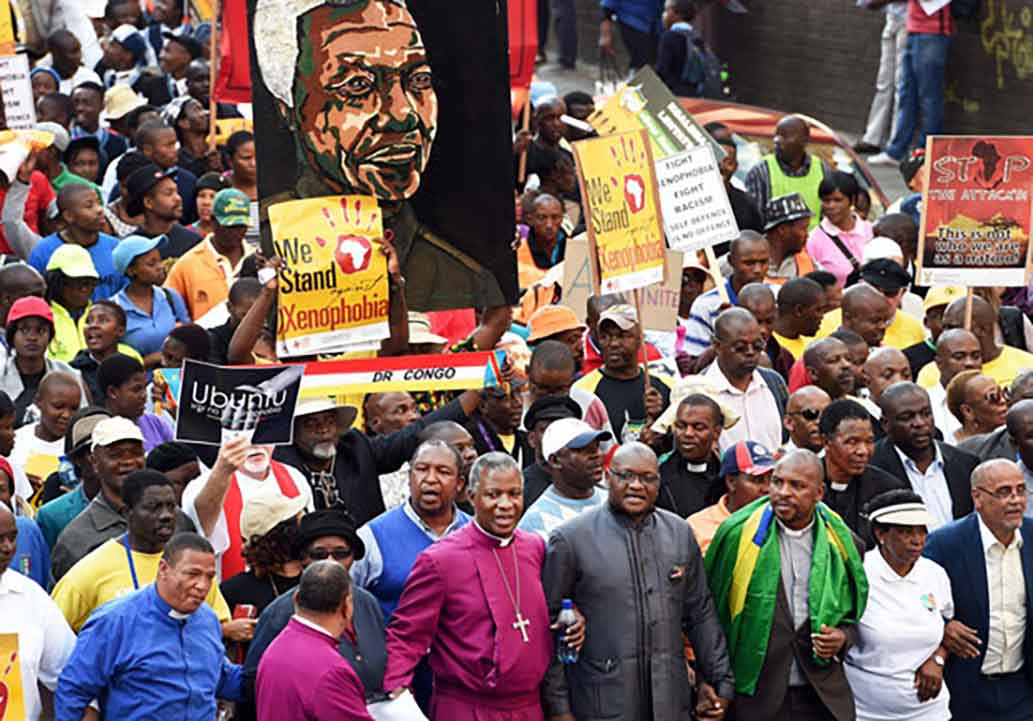Xenophobia is a critical issue in South Africa, as attitudes towards immigrants are often negative and threatening. Despite empirical evidence showing that immigrants have an overall positive effect on employment and the South African economy, violence and negative rhetoric continue. In November 2023, Jessie-Lee Smith attended a policy dialogue in Polokwane, Limpopo, where HSRC researcher Dr Mathias F. Alubafi presented a policy brief on the importance of institutionalising the social integration of immigrants into South African communities. Smith and Alubafi present recent HSRC research on xenophobia in this article.

Key leaders from the coalition of faith-based organisations, trade unions, NGOs and corporate South Africa speak out against xenophobia during a march in Newtown, Johannesburg. Photo: GCIS, Flickr
The number of immigrants in South Africa has increased steadily over the past 30 years. Statistics South Africa showed that the number of residents born outside of South Africa rose from 958 188 in Census 1996 to 2.4 million in Census 2022. This was a minute portion of the population, with foreign nationals making up only 3% of the more than 62 million people living in South Africa at the time. Despite fears to the contrary, it has been reported that immigrants moving into South Africa have no negative effect on the economy or the labour market. Rather, according to data from a World Bank report in 1996–2011 and the Organisation for Economic Cooperation and Development (OECD) Development Centre, inflows of foreign nationals were found to have had a positive effect on employment for all South Africans.
Despite this finding, the HSRC’s 2021 round of the South African Social Attitudes Survey showed that the majority of South Africans believe foreigners in South Africa worsen unemployment and other socio-economic problems. These feelings are often fostered in radical interest groups like the anti-migrant street group Operation Dudula, recurring vigilantism and severely disruptive road blockades organised by truckers. One significant belief is that tens of millions of undocumented migrants reside in South Africa. However, while difficulties surrounding the identification of this number exist, demographic registration data clearly (and unequivocally) show that this number is hugely exaggerated. Job loss and unemployment due to immigration are also major concerns for South Africans. Yet, multiple studies present foreign participation in the various sectors of the labour market as constant at a maximum of 10–12% per sector.
Misinformation about the effects of immigration into South Africa needs to be resolved, and for many years, the HSRC has produced research and recommendations as to how to achieve this. In 2020, the HSRC published two policy briefs – based on the results of an opinion survey poll – on attitudes towards cross-border migrants and refugees in provinces where most non-nationals live and work. Policy Brief 1 stated that 26% of South Africans were strongly opposed to immigration, and that 56% had mixed feelings. This opinion poll also showed that most South Africans obtained their information about foreign nationals from broadcast media, and religion had largely shaped their opinions. It was therefore suggested that cooperation between prominent religious and political leaders and South African celebrities was critical to ending xenophobia.
The Second Policy Brief showed how negative stereotypes about cross-border migrants and refugees were common in many towns and villages, with people describing these groups as ‘violent’ and ‘dishonest’. There was also a link made in public discourse between migration and socio-economic problems. However, the more interactions South Africans had with people not born in South Africa, the less likely they were to have xenophobic views. Therefore, induction programmes (language and cultural classes), blended job creation programmes (that harness the economic benefits of migration and help stimulate the local economy – for South African citizens, too) and pathways to employment were said to be essential to ending negative attitudes directed at foreigners. Moreover, improved access to documentation for non-citizens was recommended, as this would allow foreigners to better integrate, and be better protected and less vulnerable, and would also formalise their contributions to South Africa.

Police released stun grenades and tear gas to disperse the crowds during an anti-immigrant march in Pretoria in 2017. Photo: Ihsaan Haffejee, GroundUp (CC BY-ND 4.0)
Despite these suggestions, xenophobic violence has continued over the past few years, and attitudes remain largely negative. Recently, the Presidency of South Africa and the HSRC Surplus Fund commissioned research into the root causes of anti-immigrant rhetoric. Presented in a policy brief, the findings showed that South Africa’s government could improve immigration issues and limit violence by enhancing internal processes for immigration and post-immigration integration. While South Africa conforms to global immigration norms, there is a disjuncture between policy objectives and implementation. Therefore, on 26 November 2023, HSRC researcher Dr Mathias F. Alubafi presented the policy brief at a policy dialogue at the Limpopo Office of the Premier. This brief drew on some of the key findings of the previous two policy briefs, and according to Alubafi, focused on “the importance of integration as a way of promoting living together as diverse communities”.
One important theme of the policy brief and the dialogue was that current institutional processes often fail foreign nationals. South African law requires that immigration practices be centrally coordinated by the Department of Home Affairs. Yet the management of these processes has constantly been susceptible to malpractice, and government mechanisms have often failed to control and maintain ethical practices. For example, a significant backlog exists in the issuing of visas to foreign nationals, which increases opportunities for corruption. “Corrupt officials asking for large unofficial sums of money, the issuing of fake residential permits and bribes, and the production of fraudulent passports are examples of ways in which Home Affairs officials delegitimise immigration,” says Alubafi. He adds that malpractice in departments needs to be transparently communicated to the public. This transparency can empower citizens and reduce the misinformation that often triggers violence against immigrants.
The policy brief presented at the Limpopo dialogue also asserts that institutionalising social and economic integration would legitimise foreign nationals in South African society. By allowing immigrants to take advantage of skills development programmes that can support their integration into the economy, the government can curb their participation in illegal or parallel economic activities. Moreover, programmes focused on skilling and local language proficiencies could reduce the anonymity of residents in host communities, increase opportunities for social contact and solidarity, and be an avenue for social capital creation across nationality lines.
Conclusion: The South African government has implemented strategies to curb illegal immigration into South Africa. “One of the major actions that the government has taken is the inauguration of the Border Management Authority. It is expected that the putting in place of the Border Management Authority will help reduce the number of undocumented or illegal immigrants coming into South Africa,” says Alubafi. However, integrating legal immigrants into social and economic life in South Africa is critical to ending xenophobic violence. The policy brief presented to the Office of the Premier in Polokwane sought to inform stakeholders about the importance of socially integrating foreign nationals into South African society and of the significant problems in legitimising the process of Home Affairs’ issuance of permits.
Alubafi asserts that “the issue of immigration and integration of immigrants into South African communities is a fundamental one – and requires perspectives from both South Africans and immigrants on how this can be addressed”. A migrant interviewed during the research told interviewers, ‘Sporadic violence and xenophobia in most cases is always provoked by the suspicion that undocumented or illegal immigrants are responsible for all the bad things happening in South African communities and cities. Integration of immigrants through regularising their stay in the country and communities can greatly address the issue of suspicion and violence.’
Research contact: Dr Mathias Fubah Alubafi, a senior research specialist in the HSRC’s Developmental, Capable and Ethical State research division – malubafi@hsrc.ac.za
